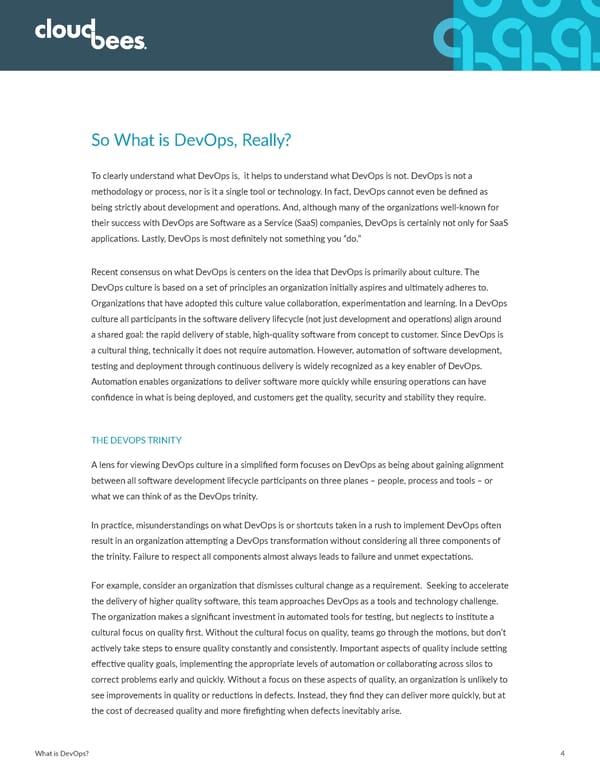So What is DevOps, Really? To clearly understand what DevOps is, it helps to understand what DevOps is not. DevOps is not a methodology or process, nor is it a single tool or technology. In fact, DevOps cannot even be defined as being strictly about development and operations. And, although many of the organizations well-known for their success with DevOps are Software as a Service (SaaS) companies, DevOps is certainly not only for SaaS applications. Lastly, DevOps is most definitely not something you “do.” Recent consensus on what DevOps is centers on the idea that DevOps is primarily about culture. The DevOps culture is based on a set of principles an organization initially aspires and ultimately adheres to. Organizations that have adopted this culture value collaboration, experimentation and learning. In a DevOps culture all participants in the software delivery lifecycle (not just development and operations) align around a shared goal: the rapid delivery of stable, high-quality software from concept to customer. Since DevOps is a cultural thing, technically it does not require automation. However, automation of software development, testing and deployment through continuous delivery is widely recognized as a key enabler of DevOps. Automation enables organizations to deliver software more quickly while ensuring operations can have confidence in what is being deployed, and customers get the quality, security and stability they require. THE DEVOPS TRINITY A lens for viewing DevOps culture in a simplified form focuses on DevOps as being about gaining alignment between all software development lifecycle participants on three planes – people, process and tools – or what we can think of as the DevOps trinity. In practice, misunderstandings on what DevOps is or shortcuts taken in a rush to implement DevOps often result in an organization attempting a DevOps transformation without considering all three components of the trinity. Failure to respect all components almost always leads to failure and unmet expectations. For example, consider an organization that dismisses cultural change as a requirement. Seeking to accelerate the delivery of higher quality software, this team approaches DevOps as a tools and technology challenge. The organization makes a significant investment in automated tools for testing, but neglects to institute a cultural focus on quality first. Without the cultural focus on quality, teams go through the motions, but don’t actively take steps to ensure quality constantly and consistently. Important aspects of quality include setting effective quality goals, implementing the appropriate levels of automation or collaborating across silos to correct problems early and quickly. Without a focus on these aspects of quality, an organization is unlikely to see improvements in quality or reductions in defects. Instead, they find they can deliver more quickly, but at the cost of decreased quality and more firefighting when defects inevitably arise. What is DevOps? 4
 What is DevOps ? Page 4 Page 6
What is DevOps ? Page 4 Page 6